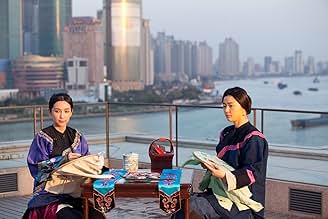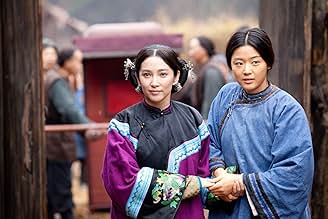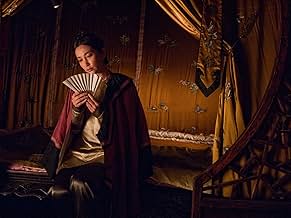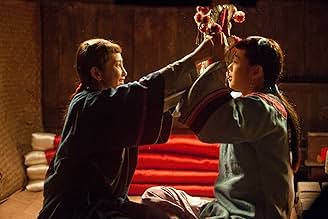CALIFICACIÓN DE IMDb
6.1/10
4.1 k
TU CALIFICACIÓN
Una historia ambientada en China durante el siglo XIX y centrada en la amistad de por vida entre dos chicas que desarrollan su propio código secreto como forma de enfrentarse a las rígidas n... Leer todoUna historia ambientada en China durante el siglo XIX y centrada en la amistad de por vida entre dos chicas que desarrollan su propio código secreto como forma de enfrentarse a las rígidas normas sociales impuestas a las mujeres.Una historia ambientada en China durante el siglo XIX y centrada en la amistad de por vida entre dos chicas que desarrollan su propio código secreto como forma de enfrentarse a las rígidas normas sociales impuestas a las mujeres.
- Premios
- 3 premios ganados y 1 nominación en total
Jun Ji-hyun
- Snow Flower
- (as Gianna Jun)
- …
Hu Qing Yun
- Mrs. Liao
- (as Jingyun Hu)
Shiping Cao
- Mr. Wei
- (as Shi Ping Cao)
Opiniones destacadas
Wayne Wang has directed another winner, "Snow Flower and the Secret Fan". It is a well designed "chick flick" that overcomes ones emotions to the point of great empathy for both the characters and the eras in which it is set. Bingbing Li plays Nina/Lily, and Gianna Jun stars as Snow Flower/Sophia. They are like blood sisters who rotate back and forth from the 19th to the 21st centuries. The story is compelling. The religious and cultural overtones are educational and well depicted. The scenes in Shanghai as well as Australia are vistas that hold one in awe. It is a Drama worth viewing and now is on Blu Ray DVD and worth the effort for the clarity of sound and visual effect. The music is especially well adapted to the film and provides another reason for the extra effect of a good sound system.
Sunflower and the Secret Fan is the poignant tale of two 21st century Asian girls and their matches in the 19th century: Both couples are bound by the dictates of a patriarchal culture that challenges the natural love and devotion they feel for each other. These lady laotongs or "old sames" take an oath to make them faithful sisters forever, the outward show of an enduring, lifelong commitment to their sisterhood.
Director Wayne Wang's challenge is to intercut the centuries and women without confusing the audience, a virtue not always achieved in two hours of traversing between times. His limited success can be attributed to the striking skyline of modern Shanghai, an apt metaphor for the change in the ladies' lives, indeed for change itself.
Just as arresting as the visual images is the stringed music of Rachel Portman, which dictates emotions as strongly as any other score I have heard this year. Some might complain of manipulation; I enjoy the excess as if it were an ancient Chinese fan of innumerable design. BTW, the titular fan was used by the 19th century ladies to make messages to each other in their special language. Wang's considerable success showing devoted friends in Joy Luck Club is evidenced in the ladies here.
The bonding of protagonists is strong on the surface, but because there is so much to do in only 2 hours, we never have sustained conversation among them to verify what we intuit without much dialogue. It would be sweet to linger more with them while they show through dialogue the bond that makes them sacrifice for each other throughout their lives.
Snow Flower and the Secret Fan in the end turns on love, its many forms and demands and on change, which frequently derails the best intentions of love itself. The ladies here evidence in delicate ways the tumult and reward accompanying a lifelong commitment to another human being. And that's no secret.
Director Wayne Wang's challenge is to intercut the centuries and women without confusing the audience, a virtue not always achieved in two hours of traversing between times. His limited success can be attributed to the striking skyline of modern Shanghai, an apt metaphor for the change in the ladies' lives, indeed for change itself.
Just as arresting as the visual images is the stringed music of Rachel Portman, which dictates emotions as strongly as any other score I have heard this year. Some might complain of manipulation; I enjoy the excess as if it were an ancient Chinese fan of innumerable design. BTW, the titular fan was used by the 19th century ladies to make messages to each other in their special language. Wang's considerable success showing devoted friends in Joy Luck Club is evidenced in the ladies here.
The bonding of protagonists is strong on the surface, but because there is so much to do in only 2 hours, we never have sustained conversation among them to verify what we intuit without much dialogue. It would be sweet to linger more with them while they show through dialogue the bond that makes them sacrifice for each other throughout their lives.
Snow Flower and the Secret Fan in the end turns on love, its many forms and demands and on change, which frequently derails the best intentions of love itself. The ladies here evidence in delicate ways the tumult and reward accompanying a lifelong commitment to another human being. And that's no secret.
A film about laotong, the bonding of two women for eternity as kindred sisters, is unusual to say the least and one that is beautifully retold in the manner of so many oriental stories must be a rarity. The reason it works so well is because it is shot at two layers, one in the present day, and the other at a time when women needed each other for support. In fact the retelling of the latter is the result of a book written by Sophia of the life of Snow Flower in the title. In each layer Sophia/Snow Flower is bonded to Nina/Lily. The acting by Gianna Jun (Sophia/Snow Flower) and Bingbing Li as Nina/Lily is extraordinary with sterling support from an excellent cast. The cinematography and soundtrack are also first rate.
In essence the story explores love in many guises via the relationship of the two present day characters and their mirrors of old, but it is only at the conclusion of the film that we are allowed to be inside the minds of the kindred sisters and their relationship. This is not a film that pivots upon romantic love since it delves very deep into the agendas the women have and for that reason alone it may not be a commercial success. That shouldn't detract from its beauty as a work of art but clearly it has had an effect on the film's popularity on IMDb. And that is a shame because it is well worth lasting all of its one hundred and four minutes including the beautiful wash drawings displayed with the final credits.
I don't know how this film manages less than six on the ratings for I feel a little mean in only giving it eight because of the material it explores. It is worthy of a visit to cinema, or even ownership of a DVD. Oriental cinema has made another worthy addition to its growing list of excellent stories turned into film.
In essence the story explores love in many guises via the relationship of the two present day characters and their mirrors of old, but it is only at the conclusion of the film that we are allowed to be inside the minds of the kindred sisters and their relationship. This is not a film that pivots upon romantic love since it delves very deep into the agendas the women have and for that reason alone it may not be a commercial success. That shouldn't detract from its beauty as a work of art but clearly it has had an effect on the film's popularity on IMDb. And that is a shame because it is well worth lasting all of its one hundred and four minutes including the beautiful wash drawings displayed with the final credits.
I don't know how this film manages less than six on the ratings for I feel a little mean in only giving it eight because of the material it explores. It is worthy of a visit to cinema, or even ownership of a DVD. Oriental cinema has made another worthy addition to its growing list of excellent stories turned into film.
I finished reading all the previous reviews to have a clear idea about what other people saw in this movie, and I must say that all that emphasis about the film being too different from the book doesn't show a great understanding of the cinematic technique. A movie is not a book. The visual, with long shots and close ups, the dialogue and the music, even the noises, take over all the written pages to express a single gesture, the full description of a landscape, or the design of a dress. A single close up can give us the essence of a full chapter.
This movie is sheer poetry.
Forget about the original book that helped to create this jewel of a movie, just watch this film, allow your senses to be absorbed by the two parallel stories --the contemporary and the historical-- and just absorb all that beauty offered to you in the story-line, the exquisite photography, the delicacy of sentiments expressed by these women (it is a terrible film for men's egos, because we come a very poor second compared with those women, overpowered by men's brutality and yet transcending the horrible handicaps imposed on them, like the tiding of their feet from early age, to convert them into defenseless crippled creatures, totally depending on men, and their virtual slaves for life).
The image of those bounded stomps, deformed to the point of becoming unrecognizable as human feet symbolizes too the humiliation some ultraconservative elements of society try to impose over minorities as if to say: "There, you'll go thru life bounded and suffering, freedom to be yourself will be denied to you because I want it so".
The total love among these "Sisters for life" was infinitely superior to the love these women could have had for their husbands. We see that in both cases --the historic and the contemporary-- and in both cases it lasted, strong, to the last consequences.
Contrary to other viewers, I didn't have the slightest problem in following the development of the two parallel stories, since it was done in a very natural, simple and honest way; both stories superbly intertwined to perfection till the final resolution.
¿A masterpiece? yes, I think so.
This movie is sheer poetry.
Forget about the original book that helped to create this jewel of a movie, just watch this film, allow your senses to be absorbed by the two parallel stories --the contemporary and the historical-- and just absorb all that beauty offered to you in the story-line, the exquisite photography, the delicacy of sentiments expressed by these women (it is a terrible film for men's egos, because we come a very poor second compared with those women, overpowered by men's brutality and yet transcending the horrible handicaps imposed on them, like the tiding of their feet from early age, to convert them into defenseless crippled creatures, totally depending on men, and their virtual slaves for life).
The image of those bounded stomps, deformed to the point of becoming unrecognizable as human feet symbolizes too the humiliation some ultraconservative elements of society try to impose over minorities as if to say: "There, you'll go thru life bounded and suffering, freedom to be yourself will be denied to you because I want it so".
The total love among these "Sisters for life" was infinitely superior to the love these women could have had for their husbands. We see that in both cases --the historic and the contemporary-- and in both cases it lasted, strong, to the last consequences.
Contrary to other viewers, I didn't have the slightest problem in following the development of the two parallel stories, since it was done in a very natural, simple and honest way; both stories superbly intertwined to perfection till the final resolution.
¿A masterpiece? yes, I think so.
While no match for some of Wayne Wang's other movies, I'd call "Snow Flower and the Secret Fan" worth seeing nonetheless. It tells the story of two friends in present-day Shanghai, and the connection that they have with two girls in 19th century China through a fan on which they wrote secret messages.
Wang famously focused on Chinese-American families in "The Joy Luck Club", and took a bittersweet look at people's lives in "Smoke". This movie doesn't equal either of those, but I still recommend it. The development of Shanghai certainly reflects the changes in the lives of the girls (and the changes that China has undergone over the past 100 years). Not great, but worth seeing.
Wang famously focused on Chinese-American families in "The Joy Luck Club", and took a bittersweet look at people's lives in "Smoke". This movie doesn't equal either of those, but I still recommend it. The development of Shanghai certainly reflects the changes in the lives of the girls (and the changes that China has undergone over the past 100 years). Not great, but worth seeing.
¿Sabías que…?
- TriviaRupert Murdoch personally asked Fox Searchlight to release this film in North America.
- ErroresThe last paragraphs of the unsent letter that Nina found in Sophias apartment, which can be seen when she closes the notebook, don't match Nina's voice-over.
- ConexionesReferenced in Conan: A Tree with Dutch Elm Disease Grows in Brooklyn (2011)
Selecciones populares
Inicia sesión para calificar y agrega a la lista de videos para obtener recomendaciones personalizadas
- How long is Snow Flower and the Secret Fan?Con tecnología de Alexa
Detalles
Taquilla
- Presupuesto
- USD 6,000,000 (estimado)
- Total en EE. UU. y Canadá
- USD 1,348,205
- Fin de semana de estreno en EE. UU. y Canadá
- USD 134,005
- 17 jul 2011
- Total a nivel mundial
- USD 11,348,205
- Tiempo de ejecución
- 1h 44min(104 min)
- Color
- Mezcla de sonido
- Relación de aspecto
- 2.35 : 1
Contribuir a esta página
Sugiere una edición o agrega el contenido que falta

































